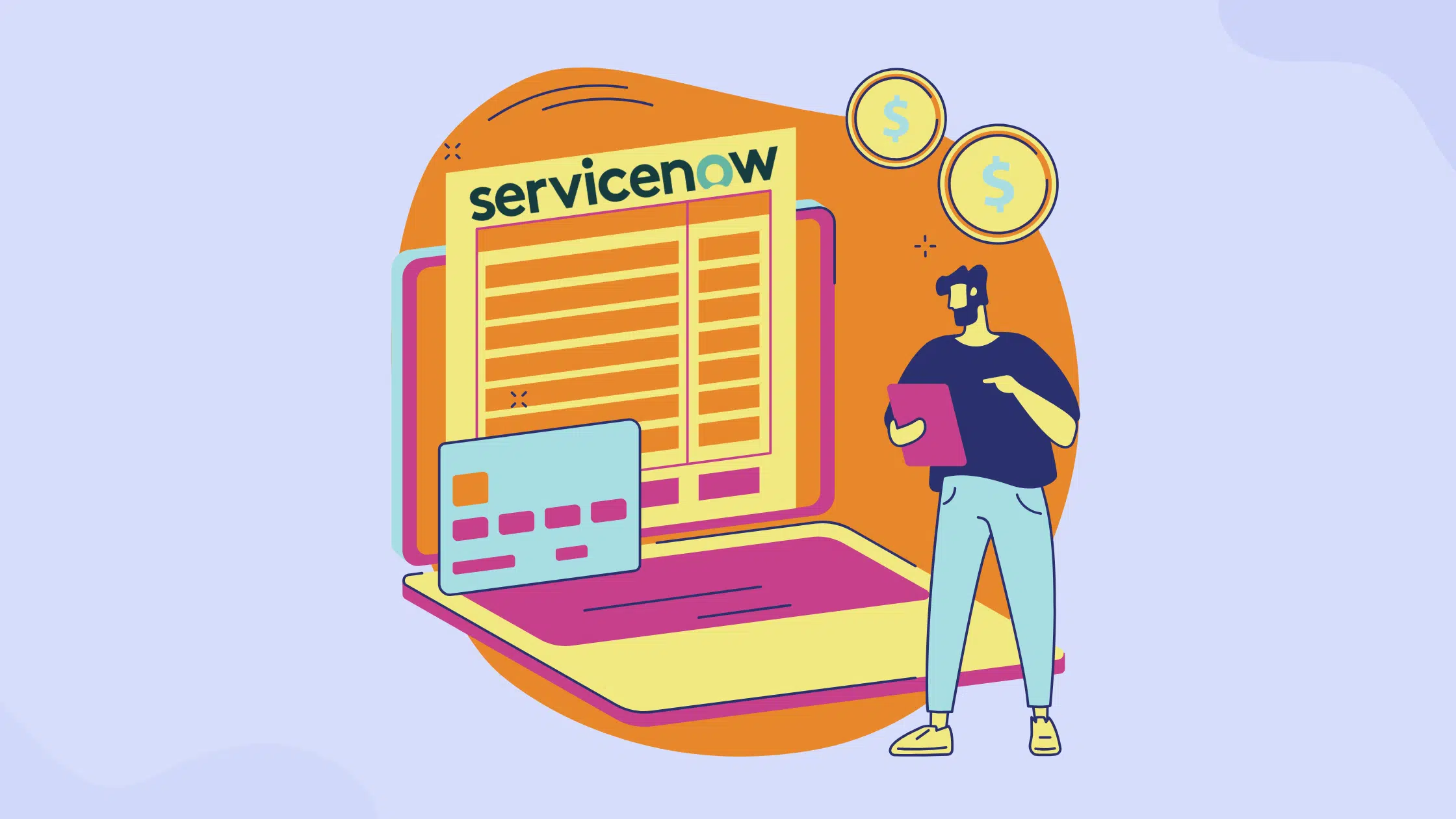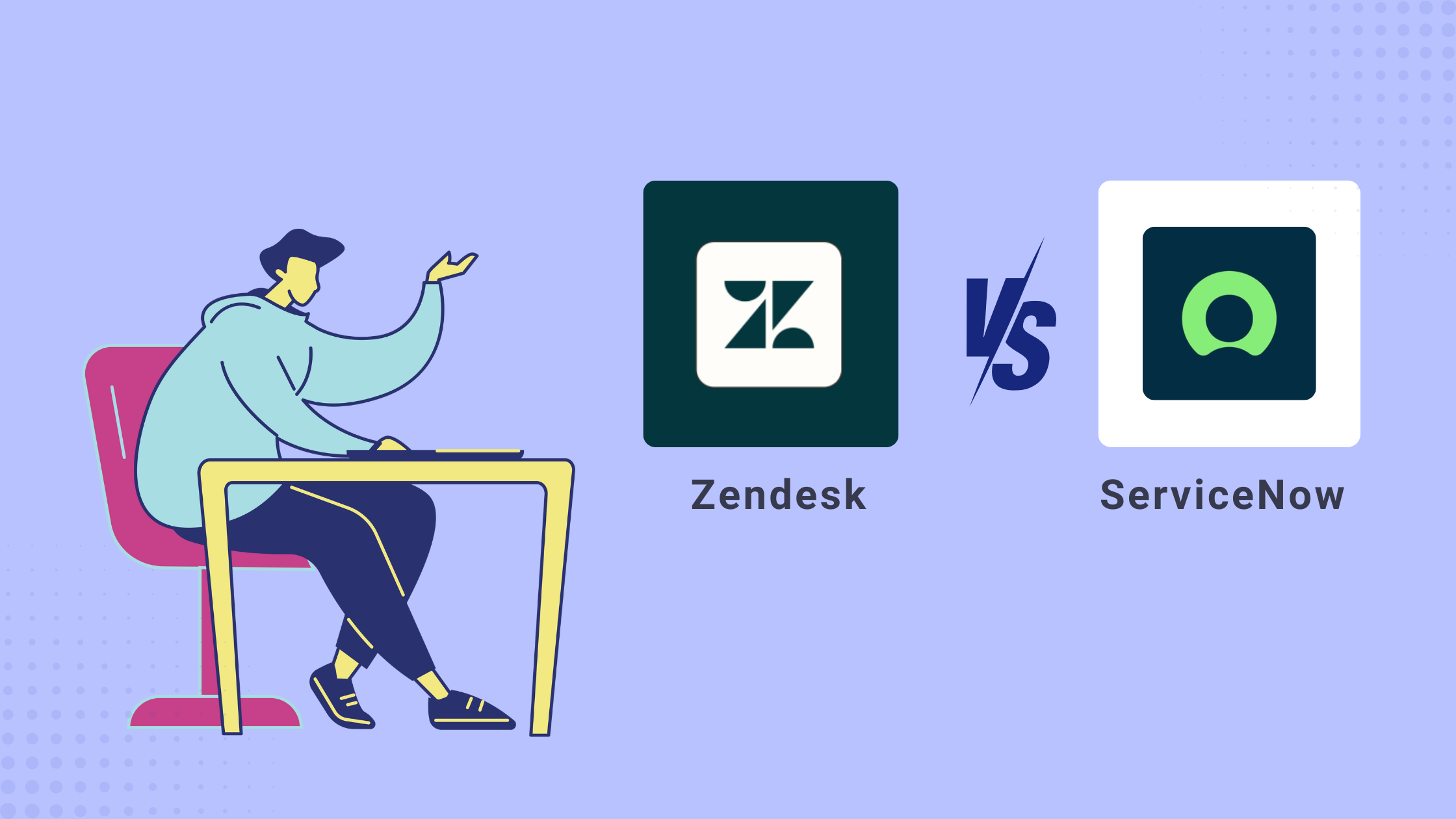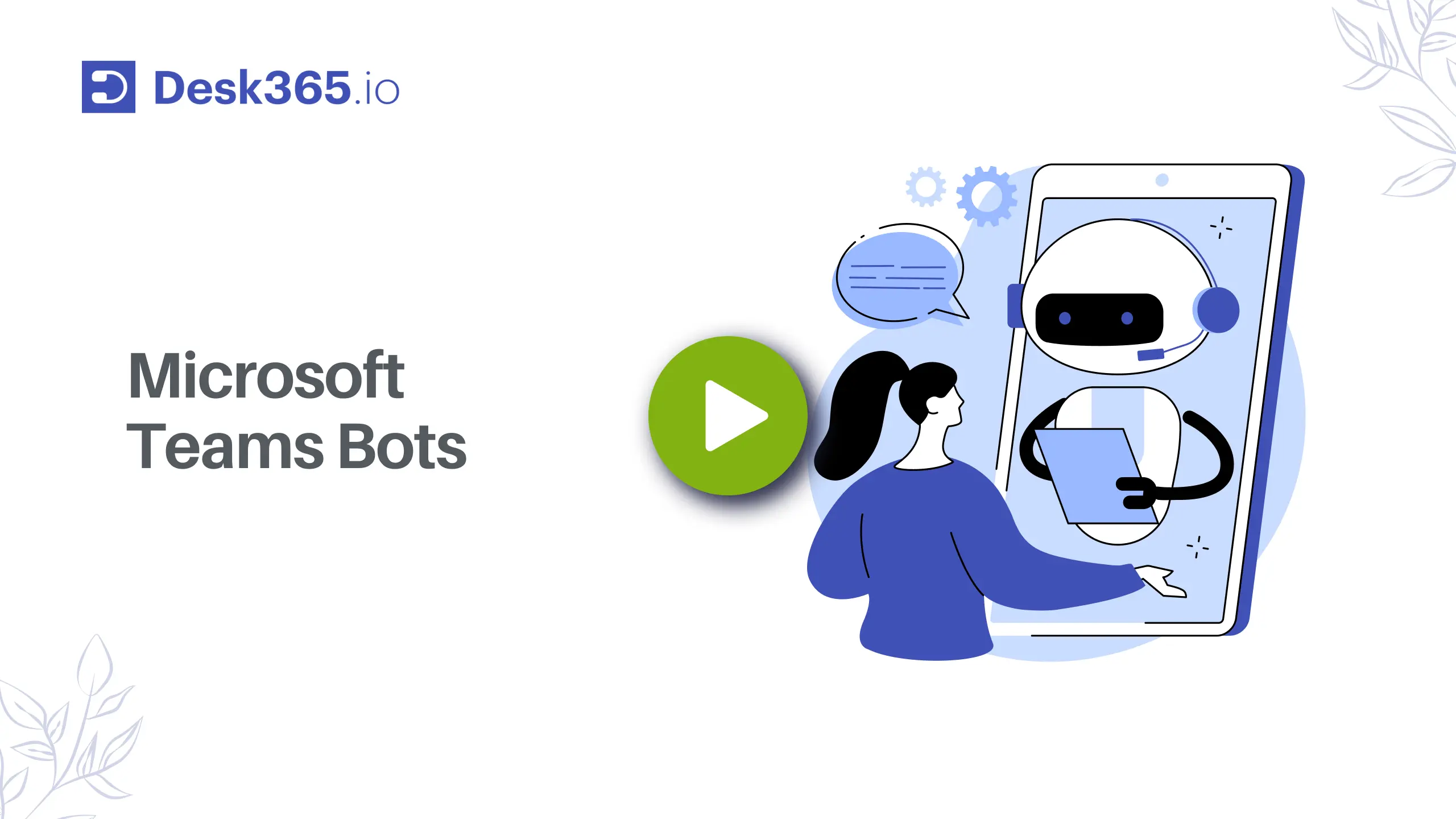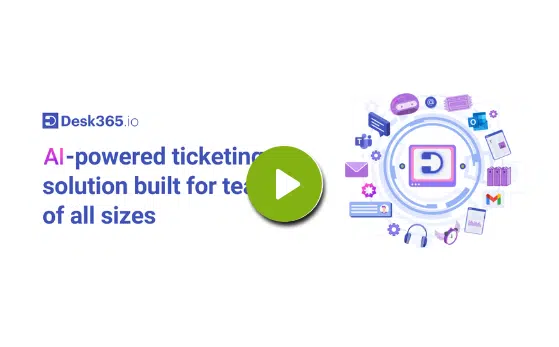ServiceNow is a powerful, customizable platform designed to meet the unique needs of businesses, especially larger enterprises. However, due to its flexibility and the wide range of modules available, ServiceNow does not publish standard pricing.
Instead, the cost is determined based on several factors, including the features and modules a business selects, the number of users, and the level of customization required.
With solutions spanning IT service management, human resources, and security operations, ServiceNow tailors its offerings to fit each organization’s specific needs, making it necessary to get a customized quote.
This approach ensures that businesses only pay for what they use and receive a solution that’s perfectly aligned with their goals.
ServiceNow different pricing models
ServiceNow offers different pricing models depending on the specific needs and structure of your organization. Understanding these models will help businesses choose the one that aligns best with their objectives and budget. Below are the primary pricing models that ServiceNow provides:
1. Subscription-based pricing
ServiceNow primarily operates on a subscription-based pricing model. In this model, organizations pay a recurring fee, typically billed annually or on a multi-year basis. The subscription cost is determined by the number of users, the modules selected, and the services required.
User-based: Pricing is usually per user per month, with rates varying based on the type of user (e.g., requesters, fulfillers, or administrators) and the level of access they need.
Module-based: Organizations can choose from a variety of modules (ITSM, ITOM, HRSD, SecOps, etc.) and only pay for the ones they need. Additional modules will increase the subscription cost.
2. Perpetual licensing
In contrast to the subscription model, perpetual licensing involves a one-time fee for a long-term license to use ServiceNow. With this model, businesses pay upfront for the software license and are often charged separately for maintenance, support, and upgrades.
One-time fee: A one-time payment grants access to the platform for as long as the business wants to use it. However, businesses are typically responsible for managing their own updates and patches.
Annual maintenance fees: Although the license itself is a one-time fee, annual maintenance fees (usually around 20%-25% of the original license cost) are required for continued support, updates, and bug fixes.
3. Per-module pricing
ServiceNow allows organizations to purchase different modules individually, meaning businesses only pay for the specific features they need. This is a flexible pricing model, especially for companies that don’t need all the functionalities offered by ServiceNow.
Core modules: Commonly, modules like IT Service Management (ITSM), IT Operations Management (ITOM), or Human Resources Service Delivery (HRSD) are offered on a per-module basis.
Add-ons: Some additional features or premium services (such as AI capabilities or advanced reporting tools) may be priced separately and added to the base cost.
4. Volume-based pricing
For large enterprises with a significant number of users, ServiceNow may offer volume-based pricing. This model offers discounts based on the volume of users or licenses purchased, making it more affordable for companies that require a larger number of users or enterprise-level access.
Enterprise discounting: Larger organizations with hundreds or thousands of users may be able to negotiate lower rates based on their size and expected usage.
Tiered pricing: With volume-based pricing, the cost per user can decrease as the number of users increases, incentivizing larger deployments.
5. Usage-based pricing
In some cases, ServiceNow may charge based on actual usage or consumption, rather than per user or per module. This model is often used for cloud-based services where businesses pay for the resources they use, such as the number of transactions, service requests, or storage capacity.
Pay-As-You-Go: Businesses pay based on how much they use the platform in a given period, offering more flexibility and potentially reducing costs if usage is lower than expected.
Metered services: For example, the number of incidents raised, or the volume of data being processed, could determine the cost.
6. Enterprise pricing
For large-scale, global organizations, ServiceNow offers enterprise pricing. This is a customized pricing structure for organizations that require significant customization, integration, and support. The cost typically includes access to a wide array of modules, premium support, and additional customization options.
Custom quotes: Pricing for enterprises is typically negotiated on a case-by-case basis, considering the organization’s specific needs, user base, and service requirements.
Comprehensive packages: Enterprise pricing packages often include everything from software licenses to consulting, integration, training, and ongoing support.
7. Freemium model
ServiceNow also offers a freemium model for certain features, particularly for smaller businesses or for those who are trying out the platform before committing to a paid subscription.
Limited access: The freemium model offers limited access to certain features and may be used for pilot programs or small-scale deployments.
Upgrade options: Businesses using the freemium version can later upgrade to a paid model as their needs grow or when they are ready to scale their deployment.
8. Cloud-based vs. On-premises pricing
ServiceNow offers both cloud-based and on-premises solutions, and pricing can vary significantly based on which option you choose.
Cloud-based pricing: The cloud version of ServiceNow typically follows a subscription-based model with lower upfront costs, and the service is maintained and hosted by ServiceNow.
On-premises pricing: For businesses that require on-premises deployment, the cost is usually higher, as the business must manage infrastructure, hardware, and ongoing maintenance.
ServiceNow offers a variety of pricing models to suit businesses of different sizes and needs. Whether you are looking for a flexible subscription model, a one-time perpetual license, or custom enterprise pricing, ServiceNow provides multiple options to help businesses scale while managing costs effectively. It’s essential to choose the right pricing model that aligns with your organizational goals, usage requirements, and budget.
ServiceNow pricing: The breakdown

Truthfully, we can’t know everything about ServiceNow pricing because every client and use case is different. Additional costs may also vary depending on the organization’s needs and the scope of the solution. Let’s break down the typical costs associated with ServiceNow, categorized into pre-implementation, go-live, and post-implementation costs.
1. Pre-deployment costs
Pre-deployment costs are expenses incurred before deploying ServiceNow. These may include:
Project scoping and requirement gathering: Involves initial consultations with experts and internal teams to define the project scope and gather business requirements.
Business process analysis: Evaluates existing workflows and processes to identify areas for improvement.
Data migration: Transfers existing data into the new Servicenow environment. Costs vary based on data volume, complexity, and the tools used.
Consultation and setup costs: Covers professional services from Servicenow or third-party consultants for configuration, customization, and integration.
Depending on the complexity of the implementation, these fees can range from $30 to $80 per hour, $400 to $600 per day, or an annual fee between $30,000 and $70,000. Consultants typically charge on-time consultation fees or a full-scale Servicenow implementation. Full-scale implementations would be part of your go-live costs.
2. Go-live costs
Go-live costs are incurred during the actual implementation of ServiceNow. This phase typically includes:
Setup and installation fees for configuring the tool across the organization and technical support.
Customization and integration costs to connect ServiceNow with existing IT systems. Add-ons such as advanced AI features or additional modules can add substantially to the total cost; sometimes ranging from 50% to 60% of the original license fee.
Testing fees to ensure smooth operation before full deployment.
Initial and ongoing training costs for users and managers of the new system.
Go-live costs can range from $10,000 to $100,000 depending on the complexity of the deployment.
3. Ongoing service costs
Ongoing service costs involve expenses incurred after ServiceNow has been deployed. Key components include:
Subscription fees: Organizations must pay for ongoing access to ServiceNow’s services, typically charged per user. For example, ITSM licenses may start at around $90/month per user, with advanced modules like ITOM costing between $150 and $200 per user per month.
Annual maintenance fees: Besides subscription fees, there is usually an annual maintenance fee starting from around $200. This fee covers software upgrades and ongoing support services.
Additional features: Over time, organizations may decide to add more users or expand Servicenow to other departments, leading to increased costs.
4. Total cost of ownership (TCO) for ServiceNow
If your organization requires heavy customization or integration with other systems, costs can quickly add up. Custom development typically comes with additional consulting fees, which can range from $150 to $300 per hour depending on the complexity and expertise required.
Consultation and setup costs
Organizations incur consultation fees before ServiceNow implementation, which vary based on business complexity and customization needs:
Small to medium businesses: $20,000 – $50,000
Larger enterprises: $100,000 – $500,000
Additional customizations may add $10,000 or more to the Servicenow price.
Service costs
ServiceNow operates on a subscription model, and costs depend on the number of users and selected features. Here are the typical prices:
Base package: $100/month per user
Enterprise-level solutions: $50 to $75/month per user
Advanced features: Up to $200 per month per user
Integration and migration costs
Data migration and third-party integrations can significantly impact costs:
Migration costs: These range from a few thousand dollars to over $100,000 for complex migrations. Tools like Precision Bridge cost $4,950 for basic instance connections.
Integration costs: Integration Hub licenses start at $100/month for the Standard Edition.
Training costs
Training expenses start from $500 for on-demand courses, and instructor-led training goes up to $2,700. Certifications vary from $300 to $15,000 for advanced programs.
Maintenance costs
Ongoing maintenance is critical for platform functionality and security. Annual maintenance fees start at $200/year but can increase based on the required support levels and implementation complexity.
Key factors affecting ServiceNow pricing
As you’ve seen, ServiceNow’s pricing model is complex. Four key factors significantly influence this complexity. These include:
1. Organization size and scope
The size of an organization plays a crucial role in determining ServiceNow costs. Larger companies typically require more licenses and modules to accommodate their complex operational needs, which can lead to higher overall expenses.
License requirements: Larger enterprises may need to purchase licenses for hundreds or thousands of users, which can cost up to $100/month per user, depending on the specific services required and the number of users.
Volume discounts: Bigger organizations often have the leverage to negotiate volume discounts, potentially reducing costs by 40-50% for core modules like ITSM.
2. Industry-specific needs and regional differences
ServiceNow tailors its pricing based on industry-specific requirements and regional considerations. Different industries, such as healthcare, finance, or manufacturing, may require specialized features that can influence pricing.
For example, security, e-commerce, government, and healthcare organizations might need additional compliance-related functionalities, which can increase costs.
There are also regional variations, with pricing influenced by market demand and local regulations. Organizations in regions with higher operational costs may face increased pricing structures.
3. Customization based on business needs
Customization based on organizational goals and user needs is a significant factor in ServiceNow pricing. ServiceNow offers out-of-the-box (oob) solutions for different automation workflows, such as incident management. These solutions are more affordable and straightforward for companies to deploy and manage. However, customization runs up costs because specialists and consultants are required to execute them.
4. Product choice and licensing models
The choice of product and licensing model directly affects the cost structure:
Bundled vs. standalone packages: Bundled packages may provide cost savings, but they can also require paying for unnecessary functionalities. Conversely, standalone modules allow for more tailored solutions but may result in higher cumulative costs.
Subscription vs. perpetual licensing: You can choose between subscription-based pricing (monthly or annually) or perpetual licensing (one-time fee plus annual maintenance). Subscription models offer more flexibility but can accumulate higher long-term costs if not managed properly.
Types of ServiceNow licenses
| License Type | User Role | Cost |
|---|---|---|
| Requester | Users can raise service requests and report incidents | Free |
| Fulfiller | Users resolve and manage service requests | Paid |
| Business Stakeholder | Users can approve or deny requests, and access reporting features | Paid |
| Unrestricted | Users have full access with no limitations, based on active users | Paid |
Overall, ServiceNow offers flexible pricing that is tailored to your organization’s needs, but the costs can add up quickly as you scale and customize the platform.
Is ServiceNow the right fit for your business?
ServiceNow is a robust, enterprise-grade platform designed to handle complex IT service management (ITSM), automation, and workflow processes across large organizations. It offers a wide range of features, including advanced automation, incident management, change management, and compliance management. These capabilities make it ideal for large enterprises that require scalability and customization for their operations.
However, as a Reddit user perfectly put it: “Using ServiceNow for 10 people is like using a surface-to-air missile to kill a squirrel in your backyard.” This analogy highlights a crucial point—ServiceNow’s vast array of features and capabilities can be overkill for small businesses or teams with simpler needs. While it excels at managing complex workflows across large teams, many businesses don’t need the full range of features or the level of complexity that ServiceNow offers.

Cons of ServiceNow
While ServiceNow offers a wealth of features, it does come with some downsides that businesses should consider:
Pricing is quite high: ServiceNow’s pricing is steep, particularly for smaller businesses or those with tighter budgets. The platform operates on a subscription-based model, and as you scale or add more features, costs can quickly increase.
Steep learning curve: Due to its comprehensive features, there is a significant learning curve involved in getting started with ServiceNow. It can take time for users to become proficient, especially for those without a technical background. This often results in higher training costs and delays in realizing the full benefits of the platform.
User interface needs improvement: The user interface (UI) in ServiceNow is functional but often described as plain and basic. While it gets the job done, it lacks the modern and intuitive design that many other platforms offer, which can affect user experience and engagement.
Complexity: ServiceNow is a complex platform with a wide range of features, customizations, and integrations. While this level of flexibility is great for large organizations, it can feel overwhelming for businesses that don’t require such a complex solution. For smaller teams or those with more straightforward needs, this complexity can be an obstacle rather than an asset.
One downside of ServiceNow IT Service Management could be its complexity. Sometimes it feels like you need a manual just to navigate through it all. Also, setting it up initially can be a bit of a hassle, especially for smaller teams. So, while it's powerful, it might not be the most user-friendly option for everyone.
Why Desk365 is the better choice?
While the ServiceNow ticketing tool is a powerful solution, it’s not always the best fit for every business. For companies that need advanced automation, change management, and compliance but without the complexities and high costs of ServiceNow, Desk365 is an excellent alternative.
Desk365 offers similar advanced features, such as:
Automation: Desk365 allows businesses to automate routine tasks, workflows, and approvals, saving valuable time and reducing manual effort.
Change and Approval Management: Much like ServiceNow, Desk365 manage change requests, approvals, and service management workflows.
Compliance Management: Desk365 helps businesses stay compliant with industry standards and regulations, ensuring that all processes are documented and meet compliance requirements.
Additionally, Desk365 is more cost-effective and user-friendly, with an intuitive interface that allows teams to get up and running quickly. It is designed to scale with your business, providing powerful functionality while maintaining ease of use.
Omni-Channel
- Microsoft Teams Ticketing
- Email Ticketing
- Customer Support Portal
- Web Form/Web Widget
- Unified Inbox
Process Automation
- Workflow Automation
- Multiple Business Hours
- Custom Response Templates
- Canned Responses
- Tasks/To-do Lists
- 'Share To' Tickets
- Time Tracking
- SLA Management & Business Hours
- SLA Reminders & Escalations
- Multiple SLAs
- SLAs in Automations
Ticket Management
- Change/Approval Management
- Round Robin Ticket Assignments
- Load Based Ticket Assignments
- Ticket Watchers
- Multiple Groups/Departments
- Draft with AI
- AI Agent
- Collision Detection
- Closure Rules
- Knowledge Base
Data & Analytics
- Customer Surveys & Reports
- Ticket Trend Reports
- Productivity/SLA Reports
- Export Data
- Scheduled Reports
- Import Data
Customization
- Custom Email Servers
- Custom Domain
- Custom Ticket Fields
- Custom Forms
- Custom Roles
- Custom Reports & Graphs
- Remove Desk365 Branding
Integrations
- Entra ID Single Sign-on
- Microsoft Entra ID Sync
- API Access
- Web-hooks
- Power Automate Connector
- Microsoft 365 Copilot Plugin
Support
- Free Setup and Installation
- Priority Support
Switch to a better Ticketing System now!
Comparison of ServiceNow and Desk365


Entry-level pricing
Begins at $12 per user per month.
Starts at $100 per user per month (typical for ITSM).
Customer support and onboarding
Offers comprehensive support and onboarding across all plans.
Offers extensive support through various channels, including email, chat, and phone, with dedicated onboarding resources available.
Ease of use
Designed with an intuitive interface that requires minimal training, allowing teams to adapt quickly and efficiently.
While user-friendly, it may require a learning curve and additional training to fully utilize its extensive features.
Reporting and analytics
Offers robust reporting tools accessible across all plans, providing detailed analytics and insights to help improve support operations.
Offers robust reporting tools, though more advanced reporting may require higher-tier plans.
Customization
Highly customizable for businesses with unique needs.
Extremely customizable, designed for large-scale enterprise customization needs.
Automation
Includes advanced automation features to improve operational efficiency.
Includes extensive automation capabilities, especially suited for complex workflows across multiple departments.
Scalability
Scales well for growing businesses but is easy to set up and manage at smaller scales.
Built for large enterprises and complex environments, but may be overkill for smaller teams.
Integration
Offers seamless integration with Microsoft Teams and other third-party applications.
Supports a wide range of integrations with enterprise systems, but may require more custom development.
Compliance Management
Includes compliance features, making it suitable for regulated industries.
Extensive compliance management features designed to meet enterprise-level regulatory requirements.
Desk365 is ideal for businesses that need a cost-effective, user-friendly solution with advanced automation, easy onboarding, and comprehensive support at a lower entry cost. It’s perfect for growing companies and small to medium-sized teams.
Signup for 21 day free trial with Desk365 today and discover how it can elevate your customer support to new heights.
ServiceNow is best suited for large enterprises with complex workflows, heavy customization needs, and extensive compliance requirements. While more expensive and complex, ServiceNow is built for handling large-scale operations with a high degree of customization and automation.






